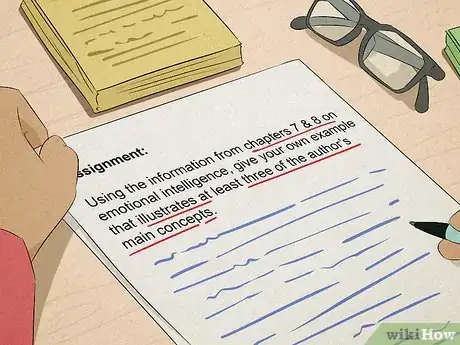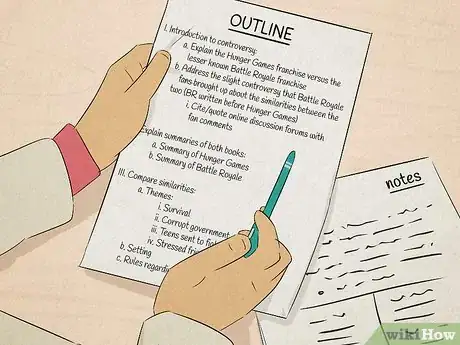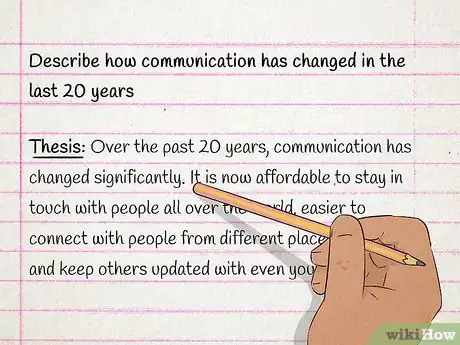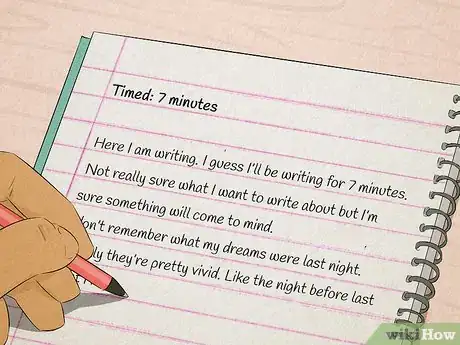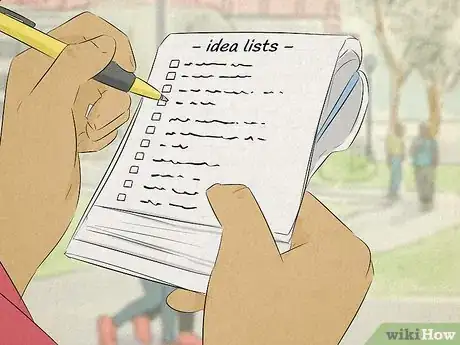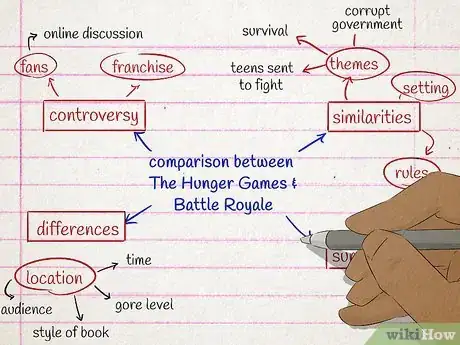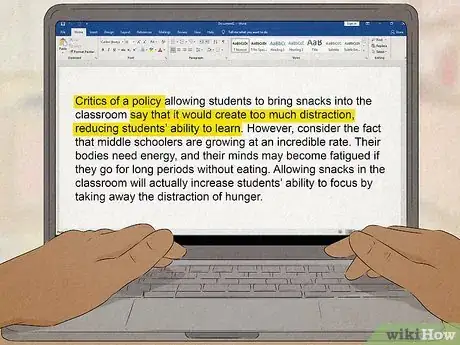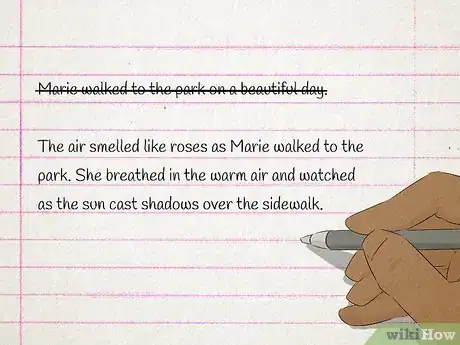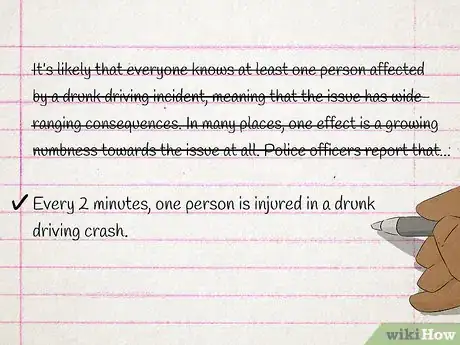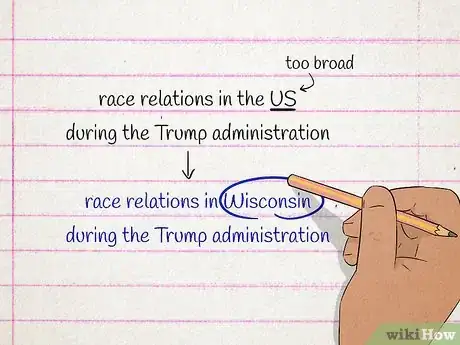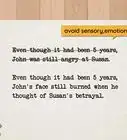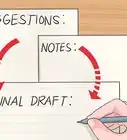This article was co-authored by Alicia Cook and by wikiHow staff writer, Madeleine Criglow. Alicia Cook is a Professional Writer based in Newark, New Jersey. With over 12 years of experience, Alicia specializes in poetry and uses her platform to advocate for families affected by addiction and to fight for breaking the stigma against addiction and mental illness. She holds a BA in English and Journalism from Georgian Court University and an MBA from Saint Peter’s University. Alicia is a bestselling poet with Andrews McMeel Publishing and her work has been featured in numerous media outlets including the NY Post, CNN, USA Today, the HuffPost, the LA Times, American Songwriter Magazine, and Bustle. She was named by Teen Vogue as one of the 10 social media poets to know and her poetry mixtape, “Stuff I’ve Been Feeling Lately” was a finalist in the 2016 Goodreads Choice Awards.
There are 12 references cited in this article, which can be found at the bottom of the page.
This article has been viewed 12,440 times.
Even when you've got a great idea, sometimes writing can leave you feeling stuck. Whether you're working on an essay for school or the novel you've always dreamed of writing, it can be hard to escape from writer's block once it starts. This article will show you the many tricks you can use to return to the drawing board and ultimately strengthen, lengthen, and clarify your work so that it is the best it can be.
Steps
Reread the directions on your assignment sheet.
-
Make sure you’ve addressed everything in the instructions. Though you may think you've covered everything in your topic, looking over the assignment again may help you find points you possibly missed in your original draft.[1] X Research source
- If you notice anything missing, take note of those missing elements and add them to your work to clarify and expand your writing.
Revisit your original notes or outline.
-
Look for any ideas or subplots you haven’t used yet. Are there any points in the finished draft that are currently missing? Is there a subplot you were originally interested in adding that got thrown out along the way? Return to those original ideas and experiment with adding them back into your work.
Reexamine your thesis or argument if you have one.
-
Revisit your original argument or intention. Ultimately, what is it that you are arguing? If you have a hard time deducing the answer to this question, you may need to strengthen your thesis.
- To strengthen and clarify your argument, make sure your thesis includes both a subject and an opinion.[2] X Research source
- Even if your writing does not include a thesis statement, examine your original topic or intention. What did you want the reader to feel when setting out to write your story? For example, you may have set out to write a grand adventure story, but find your first draft is more of a meandering journey. Consider making changes so that it can return to what you originally intended it to be.
Use free writing to brainstorm new ideas.
-
Free writing is an unstructured form of writing that can help you explore your ideas. To free write, set a time for 15 minutes and write out any thought you have on your subject. Try to avoid writing with any set goal or plan for what you’d like to accomplish. This method is more focused on simply letting your mind wander.[3] X Trustworthy Source University of North Carolina Writing Center UNC's on-campus and online instructional service that provides assistance to students, faculty, and others during the writing process Go to source
- You may not end up using all the ideas you write about, but free writing can be a great tool to help expand your mind on the subject and encourage you to get out from any writing roadblocks you've hit.
Make an idea list to think of even more.
-
List out every idea you can think of about your topic. Though you may think you’ve thought of everything, you may be surprised at the new thoughts you come up with when forced to think of new ones. To make an idea list, write down your topic or story title at the top of the page. Next, brainstorm all the directions your paper or story could go. Include even the wildest ideas you know you may not use, as this is just the experimentation stage.[4] X Trustworthy Source Purdue Online Writing Lab Trusted resource for writing and citation guidelines Go to source
- Try pushing yourself to think of anything you can! Exploring all your options can help you widen your perspective on your topic and help you think of ideas you may never have otherwise come across.
Make a mind map to organize all of your ideas.
-
This is a great tool to examine ideas and how they relate to each other. If after free writing and making an idea list you’ve come up with a new potential plotline or a major point to strengthen your argument, write it down on a piece of paper and draw a circle around it. Next, draw an arrow and add a subtopic or idea stemming from the main topic. Keep adding more ideas, drawing from either the original topic or any of the subtopics you developed. Keep writing until you have a full map of interconnected ideas. [5] X Trustworthy Source Purdue Online Writing Lab Trusted resource for writing and citation guidelines Go to source
- Use the mind map as a guide to your writing process going forward, as the connections and new ideas you came up with can help you expand and further develop points you’ve made.
Keep your audience in mind.
-
Remember that other people, not just you, will be reading your work. Consider what your audience may already know about your subject versus what information will need to be given to them.[6] X Trustworthy Source University of North Carolina Writing Center UNC's on-campus and online instructional service that provides assistance to students, faculty, and others during the writing process Go to source
- For example, the logistics of the fantasy world you’ve created may seem clear to you since you’ve developed the idea. It may not be super clear to the reader if you don’t provide enough contextual clues or necessary information to get your point across.
Ask yourself if you’ve made the subject clear.
-
The reader needs to know what your topic is really exploring. Throughout the writing process, it can be tempting to follow any interesting idea or tangent that comes to mind. As helpful as this may be when writing a rough draft, as you revise, hone in your subject so that your writing is clear to the reader.[7] X Research source
- For example, you may be writing a work of fiction about a princess. Make it clear that the story is about the princess by establishing her as the main character early on. To do this, consider focusing on her experience as the guiding plot line, providing details about her inner-monologue, and giving the reader background information about her life.
Check that you've provided necessary background information.
-
Include background information to clarify your writing. Readers need to know how your topic works, how your claim is true, or how your fictional world functions. This contextual information will give your audience a clearer, deeper picture of your work.[8] X Research source
- Let’s say you’re writing a paper on wind turbines. Before jumping into why we should adopt wind energy as a resource, explain how wind turbines work. This will help your reader be more invested in your argument, as they’ll understand how wind energy functions and can make an informed decision about whether they agree with your claim.
- If you’re working on a fantasy novel about a fictional land, add details about how people live in that world day-to-day. These details can be anything from the system of government in the land to cultural customs to fun attributes like food the characters eat.
Make sure your reader knows why the subject is important to them.
-
You need some stakes to get readers invested in your writing. Review your work to see that it successfully communicates why the topic or story is important to the reader.[9] X Research source
- An argumentative essay about toxic waste needs to include information on why toxic waste is bad, but also why that is relevant to the reader personally. Include details on the harmful effects it can have on the ecosystem, and how those toxins can affect air quality.
- If your fictional character is trying to win a marathon, why should your readers be invested in that story? Maybe the marathon can function as a metaphor for a difficult hardship they would like to overcome, or as a means to improve their life after a series of mistakes.
Research your topic thoroughly.
-
Gather more information if you find your work is lacking. Though you may have conducted some research in the initial stages of the writing process, you may need to revisit the research process and gather more information if you believe your work is in need of expanding. Take notes and pull any useful quotes or statistics that could add depth to your paper. Make sure to include where each piece of information came from, as you will need to cite your sources accurately to include that information.[10] X Expert Source

Professional Writer Expert Interview. 11 December 2020. [11] X Research source- If you're working on a fiction project and struggling with a particular point in the story, look for specific, verified sources on that topic. Let’s say there’s a battle scene in your story, but it reads as a little vague. You may need to conduct more research on specific battle tactics and types of armor.
- Similarly, your essay may be in need of additional research if you find any paragraphs lacking in information. Examine your paper to see if there are any points in need of more evidence, such as additional quotes or cited sources. Use digital libraries such as jstor.com or take a trip to the library to give your paper some more weight.[12] X Research source
Add additional evidence to your writing.
-
Use your research notes to add evidence to your writing. Review your notes in addition to your own writing to find places where quotes, statistics, or relevant information could be added as evidence within your own work. Next, integrate the quotes or paraphrase the information, making sure to cite your source correctly.
- If you are unsure of how to correctly cite a source, consult websites like https://owl.purdue.edu/, which can give you accurate information on specific citation styles.[13] X Trustworthy Source Purdue Online Writing Lab Trusted resource for writing and citation guidelines Go to source
Improve and expand your descriptions.
-
Descriptive language can help give your readers a fuller picture of your writing. Have you ever written a story for a teacher and gotten the note back, “Show, don’t tell”? The advice refers to using descriptors such as sight, sound, and smell to make your imagery more vivid. Reexamine your work for places where you may need some additional sensory details. [14] X Research source
- Take a description like “Marie walked to the park on a beautiful day.” It’s off to a good start, but it doesn’t let the reader know why exactly the day is beautiful and what the park looks like. Some sensory details can make the description much more vivid. Try something like, “The air smelled like roses as Marie walked to the park. She breathed in the warm air and watched as the sun cast shadows over the sidewalk.”
Clarify your writing.
-
There are a many steps you can take to make your writing clearer. Things like run-on sentences and passive voice make your writing difficult to understand. Review your writing so far and check if there are any points that need editing or rewording.
- If you find many run-on sentences, break them up into shorter sentences for clarity. Next, try adding some transition words to communicate how the sentences connect with each other. Examples of transition words include also, but, however, moreover, and therefore.[15] X Trustworthy Source Purdue Online Writing Lab Trusted resource for writing and citation guidelines Go to source
- A sentence written in active voice clearly states the subject performing an action, i.e. Jim mowed the lawn. In this sentence, the reader is left with no question that Jim is the subject who is mowing the lawn. Passive voice, however, does not let the reader in on that clarifying detail. Passive voice does not reveal who commits the action, i.e. the lawn was mowed. Stick to active voice to keep your writing clear and concise, and consider revising any sentences using passive voice.[16] X Trustworthy Source Purdue Online Writing Lab Trusted resource for writing and citation guidelines Go to source
Narrow down your topic.
-
Your subject may be too general to expand upon. Though you may think a broad topic would lend itself to a longer piece of writing, it can be an overwhelming and near impossible task to elaborate on too broad a topic. Pick a specific aspect of your topic so that you can go into as much detail as possible.[17] X Research source
- For example, if you are writing an argumentative essay on the need for renewable energy sources, consider writing your paper on the benefits of a particular source like wind or solar energy. A 5 page paper on every type of renewable source would have to be pretty general, as you wouldn’t have the space and time to go into much detail on the function and benefits of each one. A paper of that same length on one type of energy source allows you the space to really go into the specifics to properly expand your writing.[18] X Research source
- Picking a specific topic can also help speed up the research process, as you may have a better time finding specific, applicable sources than if your topic was too broad.
You Might Also Like

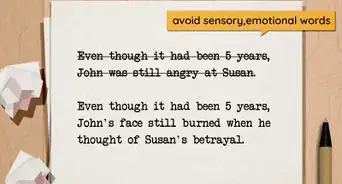

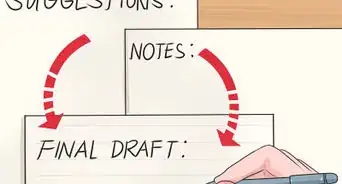
-Writing-Step-16.webp)



References
- ↑ https://libguides.lmu.edu/c.php?g=324079&p=2174109
- ↑ https://writingcenter.fas.harvard.edu/pages/essay-structure
- ↑ https://writingcenter.unc.edu/tips-and-tools/brainstorming/
- ↑ https://owl.purdue.edu/engagement/ged_preparation/part_2_lessons_1_5/index.html
- ↑ https://owl.purdue.edu/engagement/ged_preparation/part_2_lessons_1_5/index.html
- ↑ https://writingcenter.unc.edu/tips-and-tools/audience/
- ↑ https://writingcenter.fas.harvard.edu/pages/essay-structure
- ↑ https://writingcenter.fas.harvard.edu/pages/essay-structure
- ↑ https://writingcenter.fas.harvard.edu/pages/essay-structure
- ↑ Alicia Cook. Professional Writer. Expert Interview. 11 December 2020.
- ↑ https://www.library.georgetown.edu/tutorials/research-guides/15-steps
- ↑ https://www.jstor.org/
- ↑ https://owl.purdue.edu/owl/research_and_citation/resources.html
- ↑ https://www.iup.edu/writingcenter/writing-resources/organization-and-structure/descriptive-writing/
- ↑ https://owl.purdue.edu/owl/general_writing/mechanics/sentence_clarity.html
- ↑ https://owl.purdue.edu/owl/general_writing/mechanics/sentence_clarity.html
- ↑ https://libguides.lmu.edu/c.php?g=324079&p=2174109
- ↑ https://libguides.lmu.edu/c.php?g=323167&p=2173967
About This Article

